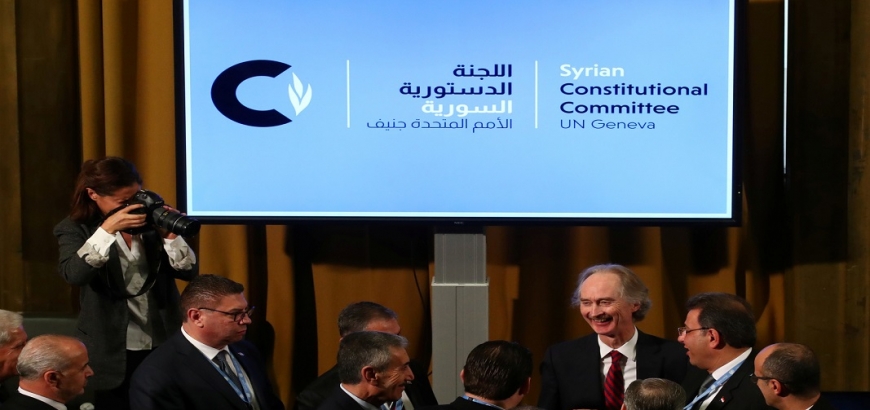The spokesman for the Negotiations Committee, Yahya al-Aridi, said that the Assad regime was insisting on breaking with reality and maintaining its structure, which is what led Syria to where it is today. He also said that the first round of the constitutional committee meetings were “better than expected.”
Regarding his assessment of the outcomes of the first round of meetings in Geneva, Aridi said that it had, “only broken some of the ice and some of the psychological and mental calcification between the students of freedom and the slaves of their choices. (The meeting) went peacefully, better than expected, because we know full well the task assigned to them (the regime delegation) is to waste time.”
Regarding the most important points of strength and weakness that the opposition discovered during the meetings of the last two weeks in Geneva, Aridi said that, “the difference is between rhetoric that puts Syria and 23 million Syrians—and the need for them to return to a free, dignified and safe life regulated by a constitution befitting them—above all else, and rhetoric (of the regime delegation) that is preoccupied with maintaining a structure that did to Syria and its people all that we are seeing.”
With regards to whether the opposition delegation felt there was seriousness on the part of the Assad regime in pushing forward a process that achieves a constitution—especially given that regime President Bashar al-Assad in a recent TV interview criticized the constitutional committee and downplayed its importance at this stage, Arid responded by saying: “Yes we felt there was seriousness in insisting on being separated from reality and in its desperation to maintain the structure that put Syria into this situation.”
On Friday, the small committee in the constitutional committee concluded its work at the UN headquarters in Geneva. The UN Special Envoy to Syria, Geir Pedersen, said there were divisions between the constitutional committee groups, and that there had been an agreement to hold the next meeting on Nov. 25, 2019.
In a press conference following the small committee sessions, Pedersen stressed the importance of discussing the remaining baskets—especially those related to governance and elections. He stressed that discussion of the constitution alone was not enough to achieve a political solution in Syria.
The head of the Negotiations Committee, Nasr al-Hariri, said that the Negotiations Committee was adhering in the constitutional committee to the principles of “commitment to the unity, independence, and sovereignty of the Syrian people and the integrity of Syrian territory and efforts to achieve the desired political transition in Syria, based on the aspirations of the Syrian people and related international resolutions, foremost the Geneva declaration and Resolution 2254.”
The joint president of the constitutional committee, Hadi al-Bahra, said that the round ended with a discussion of the ideas and proposals, which included the speeches of the enlarged committee’s members and that were put forward at the start of the session.
The meetings of the first round did not discuss the issue of prisoners and detainees, but Pedersen said that there were other tracks to do so.
The Negotiations Committee, which emerged from the Riyadh 2 conference for the Syrian opposition, submitted a note to the UN envoy calling on him to work in parallel to build a mechanism for the issue of prisoners to achieve practical measures to release prisoners, to ensure the fulfillment by the United Nations of its commitments to this humanitarian matter.
The note said it was necessary to, “open the way without impediments from the Syrian regime to the International Committee of the Red Cross and the United Nations Human Right Commissioner and other internationally-recognized organizations to access official and unofficial detention facilities in an independent fashion across Syrian territory,” and “to apply pressure to stop death sentences from courts of exceptional character.”
The note also stressed the need for, “monitoring and ensuring that the Syrian regime does not carry out ongoing violations in terms of arbitrary arrests, specifically in the settlement areas, or practice torture of any kind, such as sexual, corporal and psychological violence, especially against women.”
The note also called on, “the Syrian regime to reveal its full list of detainees and the places of their detention, and to disclose information about those who died under torture and hand their bodies over to their families.”
This article was translated and edited by The Syrian Observer. The Syrian Observer has not verified the content of this story. Responsibility for the information and views set out in this article lies entirely with the author.


